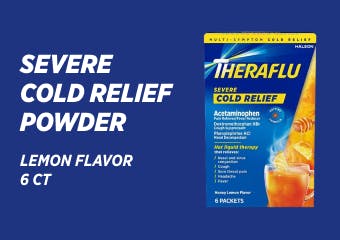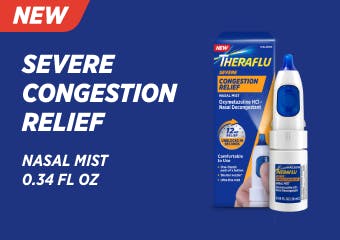Nasal congestion occurs when the tissues that line your nose become irritated, leading to inflammation and the production of excess mucus.1 A stuffy, blocked nose, or difficulty breathing through your nose are signs of nasal congestion.1,2
There are many potential causes of nasal congestion, but the good news is that there are several different remedies and treatment options available to help you get the relief you need.

What Causes Nasal Congestion?
Nasal congestion occurs when the tissues that line your nasal passages become irritated. This irritation causes them to become inflamed or swollen, making it more difficult for air to pass through them.1 This is what creates that ‘stuffy’ or blocked feeling. Your body may also produce more mucus than usual, causing a runny nose as well as a blocked one.2
What Triggers Nasal Congestion?
Anything that irritates your nasal passages can cause congestion, but some of the most common triggers are:1,2
- Allergies or hay fever (‘allergic rhinitis’)
- Cold and flu viruses
- Sinus infection
- Exposure to irritants such as chemicals, smoke or perfume
- Dry, cold air
- Certain medications, like those used to treat high blood pressure
- Hormonal imbalances
While nasal congestion can be irritating, it generally isn’t a serious condition.1 Depending on the cause of your stuffy nose, you may also experience sinus congestion at the same time.
What is a Runny Nose?
If you are experiencing a runny nose, you’re likely encountering a mucus buildup that drips out of your nose, which may be caused by nasal congestion.1 In some instances, the mucus may also run down the back of the throat, which is known as post-nasal drip.2
How Long Does Nasal Congestion Last?
Most cases of nasal congestion caused by a virus will resolve. For adults, speak to your doctor if:1,2
- Your nasal congestion gets worse or symptoms last more than ten days
- You have a high fever
- The nasal discharge is yellow or green in color and is accompanied by sinus pain or fever, which may be a sign of bacterial infection
- You have blood in your nasal discharge, or experience a persistent clear discharge after a head injury
For children, seek medical attention if:1,2
- Your baby's runny nose or congestion causes trouble with nursing or bottle-feeding, or makes breathing difficult
How Can I Prevent Nasal Congestion?
You can reduce the risk of catching viral infections like the cold or flu by washing your hands frequently, avoiding any close contact with people you know are sick and keeping up a healthy lifestyle, meaning lots of sleep, a nutritious diet, and daily exercise.4 However, if allergies are the cause of your nasal congestion, you may need to take steps to avoid the allergen, or speak to a healthcare provider about treatment.3
Nasal Congestion Remedies – How to Help Get Rid of a Stuffy Nose
If you’re suffering with a stuffy or blocked nose, there are a few at-home remedies you can try to help provide some relief.
- Moisture – Dry air makes nasal congestion worse, as the lack of moisture in the air can dry out the membranes in the nose, causing mucus to thicken. This can potentially lead to congestion, blocked sinuses, and infection, so look to increase humidity in the air you’re breathing.1,3
- Rinsing – Using a saline (salt water) solution or other nasal irrigation devices to rinse your nasal passages of excess mucus or other irritants can help to reduce inflammation.1,3
- Keep your fluids up – Drink water and other fluids regularly, as this will help to thin out any nasal mucus that might be causing a runny nose.3
Decongestants Can Provide Relief
Decongestant medicines can provide temporary nasal congestion relief. These work by reducing the inflammation in your blood vessels to create more space in your nasal passages, making it easier to breathe through your nose.5 They can be taken orally as a tablet, capsule, flavored powder, liquid, or syrup, or may be applied more directly via a nasal spray.5
Theraflu Severe Congestion Nasal Mist and Theraflu Severe Congestion Nasal Mist + Cooling provide 12 hours of long-lasting relief of severe nasal congestion due to the common cold or allergies. It’s more comfortable to use versus the leading oxymetazoline nasal mist.
Try Theraflu-D Flu Relief Max Strength + Nasal Decongestion syrups to help relieve nasal & sinus congestion, headache, fever, and sore throat pain. They're available in daytime and nighttime formulations and contain pseudoephedrine, the strongest oral nasal decongestant available without a prescription.





